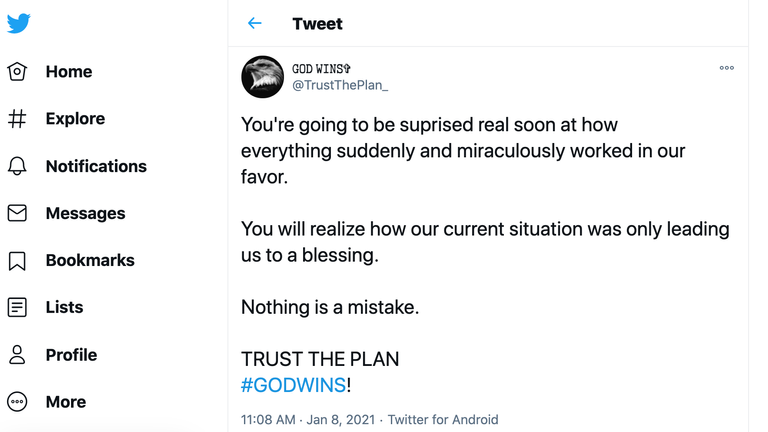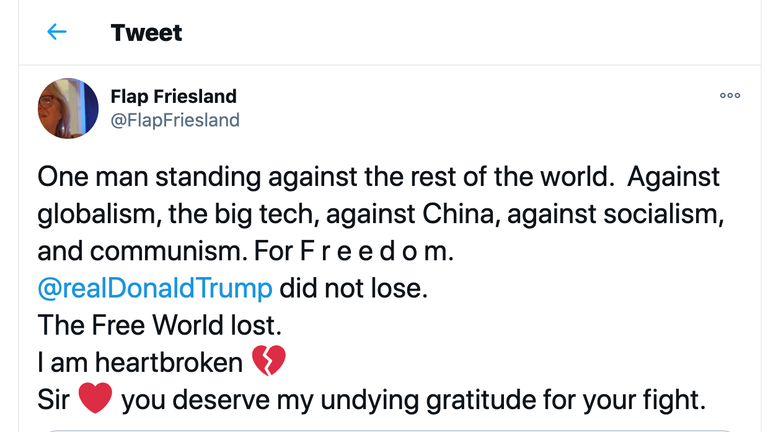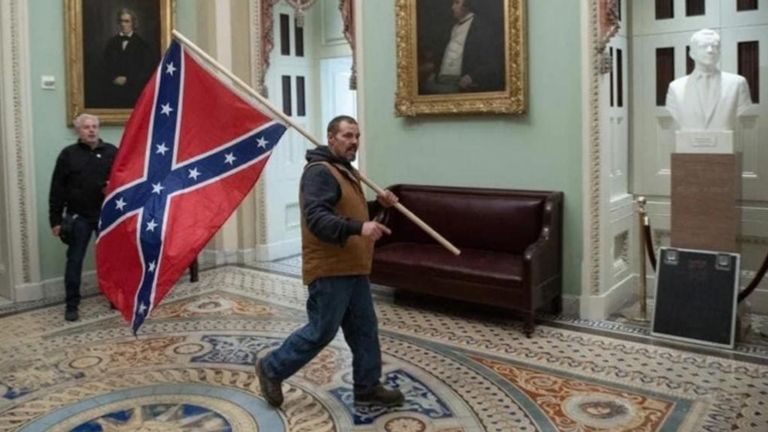The future of the QAnon movement is uncertain under a Biden administration whose existence would shatter many of its guiding prophecies – but followers are not giving up hope just yet.
Despite condemning those who rioted on Wednesday, Donald Trump‘s speech did not mention Joe Biden as the next president of the United States, instead stating: “A new administration will be inaugurated on January 20th. My focus now turns to ensuring a smooth, orderly and seamless transition of power.”
Some of the president’s supporters have accused him of betraying them by stating he was “outraged by the violence, lawlessness, and mayhem” caused by those who he had instructed to march on the Capitol.
But many QAnon supporters – who espouse a conspiracy theory in which Mr Trump is secretly fighting against an evil global cabal – drawing inspiration form vice president Mike Pence’s statement in November asserting “there will be a smooth transition to a second Trump administration”, are not recognising his statement as a concession.
The president acknowledged that Congress had certified the electoral college votes for Mr Biden, although without mentioning the Democrat’s name, but repeatedly signalled his dissatisfaction with the election.
Most onlookers outside the QAnon movement found his statement significantly more measured than his previous claims of electoral fraud.
Some suspected it was written by an aide to address suggestions that he be removed under the fourth section of the 25th Amendment to the Constitution.
Mr Trump said: “We have just been through an intense election and emotions are high, but now tempers must be cooled and calm restored. We must get on with the business of America.
“My campaign vigorously pursued every legal avenue to contest the election results. My only goal was to ensure the integrity of the vote. In so doing I was fighting to defend American democracy.
“I continue to strongly believe we must reform our election laws to verify the identity and eligibility of all voters, and to ensure faith and confidence in all future elections,” he added.
Across a range of social media sites – including Twitter and Facebook, where QAnon followers are present despite the platforms’ attempts to address the harms from the conspiracy theory, as well as on fringe sites – some supporters of Mr Trump are stressing that he has not withdrawn his previous claims of fraud.
Some supporters appear to have acknowledged his defeat, saying they are heartbroken, while other people within QAnon communities are repeating catch-phrases such as “trust the plan” alongside unironic references to four or five-dimensional chess – intended to suggest an outcome favourable to them will result from the current situation.
It isn’t clear what will happen to this community in the future, but much of that is down to Mr Trump’s messaging.
Concluding his speech, he addressed his “wonderful supporters” and said: “I know you are disappointed, but I also want you to know, that our incredible journey is only just beginning.”
Dr Evan Lawrence, a senior lecturer in international relations at the University of Central Lancaster and an expert in terrorism, told Sky News that the future of these groups was a matter for concern.
“I think we’re starting to see a fracturing of the Republican Party into these really extreme Trump supporters, and within that there are these ones who are extremely right-wing, very pro-guns, very ‘I will fight for my rights’,” she added.
“That becomes very dangerous when they start organising online, using social media to organise protests, because the nature of what they’re protesting and how they’re doing it – as you can see with the Capitol – doesn’t take a lot to be incited into violence.”
Dr Lawrence told Sky News that far-right referrals to the UK counter extremism Channel programme now comprised about 50% of all referrals.
She said: “When we look at the ways that those groups radicalise, it is mainly online. It’s YouTube videos and Xbox games, it’s using social media.
“I don’t think they [extreme pro-Trump supporters] have much of a structure at the moment,” Dr Lawrence said, “but I don’t think it’s outside of the realms of possibility that in the near future we will see them develop more” into organisations which resemble domestic terrorist threats, she added, potentially even aligning with white extremist groups.



